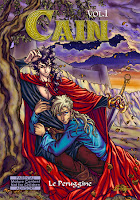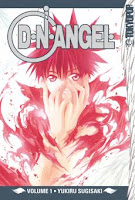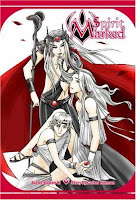My News and Reviews
I’ve been rather lazy (and busy) lately, so the “My News and Reviews” section is going to be brief this week. Last week I posted three reviews, two here at Experiments in Manga and one over at Experiments in Reading. First up was Keigo Higashino’s award-winning novel Naoko which I liked even better than the only other of his works currently available in English, The Devotion of Suspect X (also an award winner). At Experiments in Reading I posted a review of the third (and possibly final) book in Jane Lindskold’s Breaking the Wall series, Five Odd Honors. I mention it here because the magic system is based on mahjong, granted a Chinese version. But still—Mahjong! And finally, my first in-depth manga review for May: Vagabond, Omnibus 1 by Takehiko Inoue based on Eiji Yoshikawa’s epic historical novel Musashi, which I reviewed last month.
Derik Badman at The Panelists will be hosting the Manga Moveable Feast this month. This time around, we’ll be focusing on Mitsuru Adachi’s Cross Game. The Feast will start on May 22nd and run until May 28th. I’ll be reviewing the first volume published by Viz Media, which is equivalent to the first three volumes released in Japan.
Quick Takes
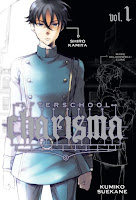 Afterschool Charisma, Volume 1 by Kumiko Suekane. Somehow, I’m not quite convinced by the clones. They don’t all seem to have the sort of quirks stereotypically associated with their original personalities. Granted, that seems to be part of the point. And Suekane does do some nice things with the concept, like everyone shunning Hitler because of his original even when the clone hasn’t done anything. It would have been nice to have some sort of list of the characters’ historical basis; while I easily identified some of the originals, there were others I had never even heard of before. I didn’t particularly care for the “Almighty Dolly” subplot, though I appreciated its significance. This could turn out to be a really interesting series.
Afterschool Charisma, Volume 1 by Kumiko Suekane. Somehow, I’m not quite convinced by the clones. They don’t all seem to have the sort of quirks stereotypically associated with their original personalities. Granted, that seems to be part of the point. And Suekane does do some nice things with the concept, like everyone shunning Hitler because of his original even when the clone hasn’t done anything. It would have been nice to have some sort of list of the characters’ historical basis; while I easily identified some of the originals, there were others I had never even heard of before. I didn’t particularly care for the “Almighty Dolly” subplot, though I appreciated its significance. This could turn out to be a really interesting series.
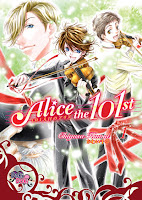 Alice the 101st, Volumes 1-2 by Chigusa Kawai. As a musician, Alice the 101st appeals to me a great deal. It’s a little goofy and over the top on the drama, but it’s actually a pretty realistic portrayal of what it takes to become a professional performer. The characters all have very strong personalities even if they tend to be a little one-note (hehe). Alice himself is extremely spastic which could get annoying, but I found to be generally amusing. The introduction of Georges (and a brief cameo by Robert) in the second volume makes a nice crossover from one of Kawai’s other manga series, La Esperança. I really want to know what is going on between Vick and Max, so I hope another volume is released soon.
Alice the 101st, Volumes 1-2 by Chigusa Kawai. As a musician, Alice the 101st appeals to me a great deal. It’s a little goofy and over the top on the drama, but it’s actually a pretty realistic portrayal of what it takes to become a professional performer. The characters all have very strong personalities even if they tend to be a little one-note (hehe). Alice himself is extremely spastic which could get annoying, but I found to be generally amusing. The introduction of Georges (and a brief cameo by Robert) in the second volume makes a nice crossover from one of Kawai’s other manga series, La Esperança. I really want to know what is going on between Vick and Max, so I hope another volume is released soon.
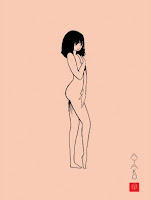 Ayako by Osamu Tezuka. One of Tezuka’s darker adult titles, Ayako is not an easy read even if it is hard to look away. Women are not treated well at all and poor Ayako herself seems to be considered more of an object to possess and control rather than an actual person. The Tenges are one messed up family and it’s difficult to feel any sort of sympathy for them. First and foremost they take care of the family and its reputation, even if individual members must suffer for it. The ending did feel a bit forced to me—I was wondering how Tezuka was going to try to tie everything together—but it was somehow appropriate despite the blatant symbolism.
Ayako by Osamu Tezuka. One of Tezuka’s darker adult titles, Ayako is not an easy read even if it is hard to look away. Women are not treated well at all and poor Ayako herself seems to be considered more of an object to possess and control rather than an actual person. The Tenges are one messed up family and it’s difficult to feel any sort of sympathy for them. First and foremost they take care of the family and its reputation, even if individual members must suffer for it. The ending did feel a bit forced to me—I was wondering how Tezuka was going to try to tie everything together—but it was somehow appropriate despite the blatant symbolism.
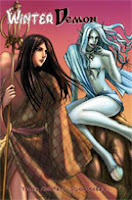 Winter Demon, Volumes 1-4 written by Yamila Abraham, illustrated by Studio Kosaru, Le Peruggine, and Rhea Silvan. I found it a little strange at first that the artist would often change from chapter to chapter, but it was interesting to see the characters captured in different styles while still remaining obvious who was who. The first volume of Winter Demon is probably the weakest, but the series steadily improves as the story progresses. However, I wasn’t entirely convinced by how easily Hakuin seemed to fall for Fuyu even if it made me happy to see them happy together. Two side stories are introduced in the series and eventually Abraham ends up bringing all three together in the final volume, which I liked.
Winter Demon, Volumes 1-4 written by Yamila Abraham, illustrated by Studio Kosaru, Le Peruggine, and Rhea Silvan. I found it a little strange at first that the artist would often change from chapter to chapter, but it was interesting to see the characters captured in different styles while still remaining obvious who was who. The first volume of Winter Demon is probably the weakest, but the series steadily improves as the story progresses. However, I wasn’t entirely convinced by how easily Hakuin seemed to fall for Fuyu even if it made me happy to see them happy together. Two side stories are introduced in the series and eventually Abraham ends up bringing all three together in the final volume, which I liked.
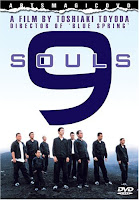 9 Souls directed by Toshiaki Toyoda. Nine inmates, the titular 9 Souls, unexpectedly manage to escape their prison cell. They plan to stick together at least until they find a rumored stash of counterfeit currency. Nine men travelling together are bound to attract some attention, especially when their disguises are limited to dressing in drag or wearing glasses and pasted on facial hair. One by one they find the end to their own story as they try to reconnect with their past lives or start new ones. While the film ends on a serious note, there’s actually a fair amount of humor in 9 Souls. I hadn’t heard of the film before and just picked it up randomly, but I actually quite enjoyed it.
9 Souls directed by Toshiaki Toyoda. Nine inmates, the titular 9 Souls, unexpectedly manage to escape their prison cell. They plan to stick together at least until they find a rumored stash of counterfeit currency. Nine men travelling together are bound to attract some attention, especially when their disguises are limited to dressing in drag or wearing glasses and pasted on facial hair. One by one they find the end to their own story as they try to reconnect with their past lives or start new ones. While the film ends on a serious note, there’s actually a fair amount of humor in 9 Souls. I hadn’t heard of the film before and just picked it up randomly, but I actually quite enjoyed it.
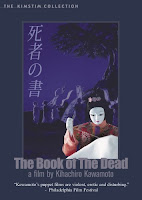 The Book of the Dead directed by Kihachirō Kawamoto. It’s been a long time since I’ve seen a stop action animation, so although I had never seen before The Book of the Dead I felt rather nostalgic watching the film. The story, based on a novel by Shinobu Orikuchi, feels a little disjointed and I think I missed some of the finer cultural aspects of the tale since I’m not particularly familiar with 8th century Japan. However, the puppets are both beautiful and creepy as needed for the story. Iratsume, a sought after and young noblewoman, has a vision, mistaking the young man she sees in it for the Buddha. In actuality, he is the soul of an executed prince and he mistakes her for the last woman he saw before his death.
The Book of the Dead directed by Kihachirō Kawamoto. It’s been a long time since I’ve seen a stop action animation, so although I had never seen before The Book of the Dead I felt rather nostalgic watching the film. The story, based on a novel by Shinobu Orikuchi, feels a little disjointed and I think I missed some of the finer cultural aspects of the tale since I’m not particularly familiar with 8th century Japan. However, the puppets are both beautiful and creepy as needed for the story. Iratsume, a sought after and young noblewoman, has a vision, mistaking the young man she sees in it for the Buddha. In actuality, he is the soul of an executed prince and he mistakes her for the last woman he saw before his death.
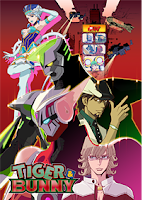 Tiger & Bunny, Episodes 1-7 directed by Keiichi Satou. Initially, I had no intention of watching Tiger & Bunny—superheros generally aren’t my thing. But then just about everyone I know started raving about the series and I started to feel left out. So I watched it and had a fantastic time. The show is a lot of fun; there’s a reason it already has a significant fan following. It’s somewhat episodic (but that is changing), and the existence of super powered humans is only halfheartedly explained, but the character interactions are great. That being said, for me it is the characters that carry the anime, particularly Tiger. I find him adorkable, but if you don’t like him, you probably won’t like the show, either.
Tiger & Bunny, Episodes 1-7 directed by Keiichi Satou. Initially, I had no intention of watching Tiger & Bunny—superheros generally aren’t my thing. But then just about everyone I know started raving about the series and I started to feel left out. So I watched it and had a fantastic time. The show is a lot of fun; there’s a reason it already has a significant fan following. It’s somewhat episodic (but that is changing), and the existence of super powered humans is only halfheartedly explained, but the character interactions are great. That being said, for me it is the characters that carry the anime, particularly Tiger. I find him adorkable, but if you don’t like him, you probably won’t like the show, either.

